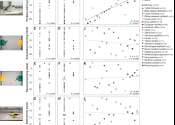A new way of thinking about how organ architecture develops
Within every developing embryo lies the mystery of self-organization: How does an organism go about shaping itself even while it's in the process of making its parts?

Within every developing embryo lies the mystery of self-organization: How does an organism go about shaping itself even while it's in the process of making its parts?
Cell & Microbiology
Dec 11, 2023
0
50

There's no organism on Earth that lives free of threat—including bacteria. Predatory viruses known as phages are among their most dire foes, infiltrating their cells to replicate and take over. Bacteria have evolved an ...
Cell & Microbiology
Nov 15, 2023
0
34

If a delivery person leaves a package on your front step without pinging you, you likely won't know it's there. A hungry cell awaiting refuel is in a similar position. It has to be alerted to the presence of nutrients outside ...
Cell & Microbiology
Nov 6, 2023
0
155

The European starling boasts a remarkable repertoire. Versatile songbirds that learn warbles, whistles, calls, and songs throughout their lives, starlings rank among the most advanced avian vocal learners. Now a new study ...
Plants & Animals
Sep 14, 2023
0
73

Life runs on ribosomes. Every cell on Earth needs ribosomes to translate genetic information into all the proteins needed for the organism to function—and to in turn make more ribosomes. But scientists still lack a clear ...
Cell & Microbiology
Jul 6, 2023
0
402

None of us are born with a fully functioning immune system, and the first few months of life are crucial for establishing strong lifelong defenses. Better understanding how germs influence the development of human immunology ...
Cell & Microbiology
Jun 13, 2023
0
80

Cellular life hinges on a network of hollow cables called microtubules dynamically lengthening and shortening according to the needs of the moment. During cell division, for instance, these cables latch onto chromosomes and ...
Cell & Microbiology
May 1, 2023
0
20

For the nutrients that feed our cells to reach their destination, proteins embedded in the cell membrane often must shuttle what's needed across the threshold. When this system breaks down and metabolites fail to reach their ...
Cell & Microbiology
Apr 26, 2023
0
13

It's a dangerous world out there. From bacteria and viruses to accidents and injuries, threats surround us all the time. And nothing protects us more steadfastly than our skin. The barrier between inside and out, the body's ...
Evolution
Apr 24, 2023
1
122

COVID is not yet under control. Despite a bevy of vaccines, monoclonal antibodies, and antivirals, the virus continues to mutate and elude us. One solution that scientists have been exploring since the early days of the pandemic ...
Bio & Medicine
Mar 14, 2023
0
104